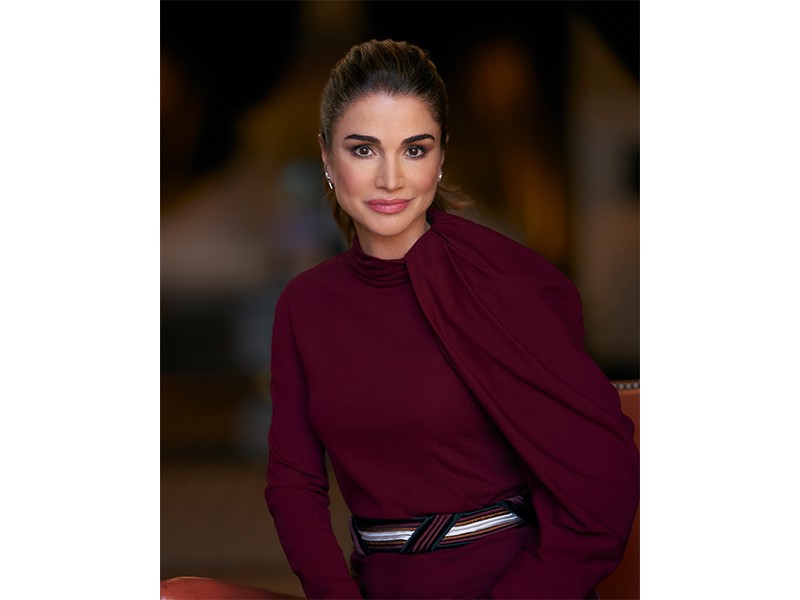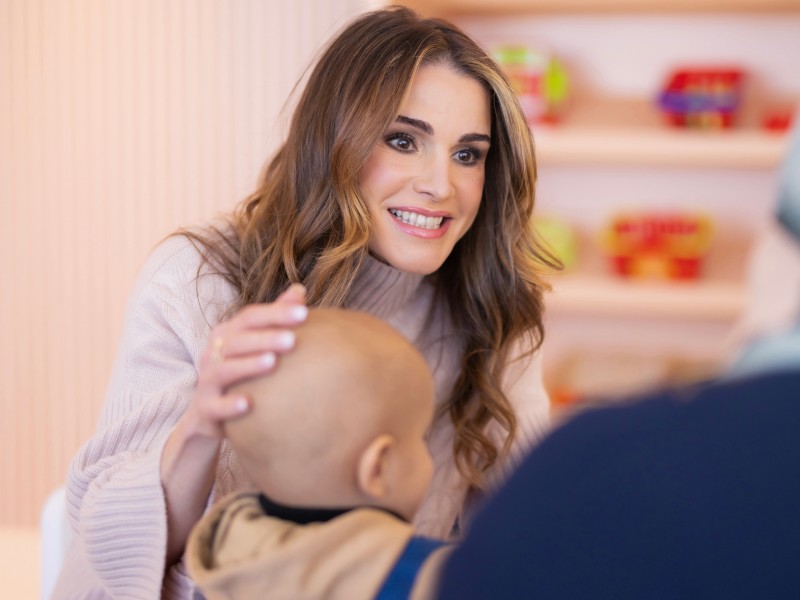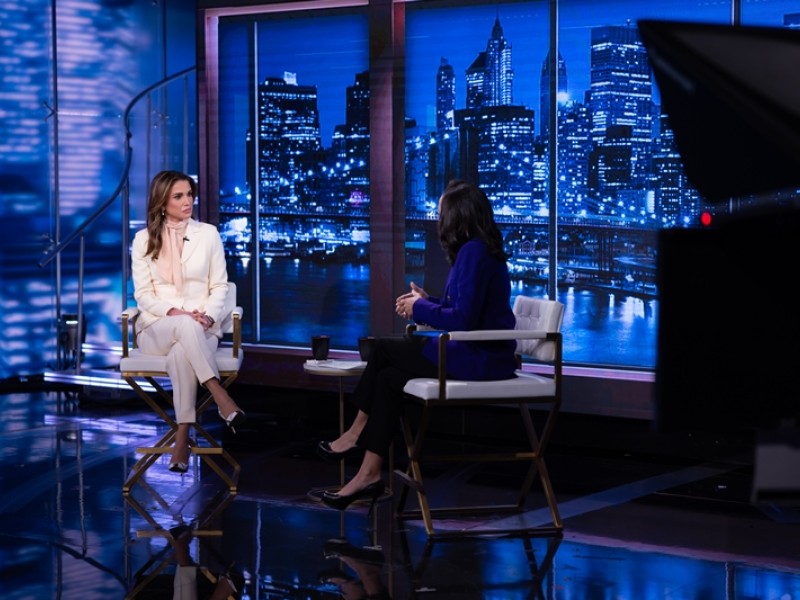Queen Rania's Interview with Il Messaggero

Lucia Pozzi: You are the Founder and Chairperson of the Jordan River Foundation. What exactly is the mandate of the Foundation and what compelled you to found it?
Queen Rania: My work with the Jordan River Foundation is especially close to my heart, because the JRF’s achievements are so apparent in human terms – women educated, children protected, communities uplifted, progress made.
I wanted to lift the lives of ordinary Jordanians, especially women and children, but I wanted to do it in such a way so as to empower them in the process. It wasn’t about handouts ie. giving a man a fish; it was more about teaching them how to fish.
I wanted JRF to provide a helping hand for people who are trying their best to get a small business up and running, but lacked the seed funding or some accountancy training…for mothers who had skills and wanted to work, but also wanted to be in their homes raising their children…and for cottage-farmers in rural communities who wanted to expand their enterprises, streamline their practices, and increase their profits.
And it was also an amazing way to revive and keep alive some of Jordan’s most valuable cultural traditions like rug weaving, basket making and embroidery.
Lucia Pozzi:What are the main focus areas of your Foundation and why has Your Majesty selected to spearhead these particular issues?
Queen Rania: The two main focus areas are protecting the rights and needs of children through our Child Safety Program; and empowering individuals and communities through the Community Empowerment Program.
Before we started the Child Safety Program (CSP), and brought child abuse out into the open, it was a taboo subject in Jordan…something to be covered up, not spoken of, and feel ashamed about. That was partly due to the sanctity of the family unit in the Arab world which is something we hold very dear. Traditionally, family issues were resolved within the boundaries of that unit.
So, that made confronting the issue–overcoming those boundaries, without breaking them – all the more challenging. I was determined to remove the culture of blame and shame, really tackle the root causes, and provide children and families with first-rate rehabilitation. I’m pleased to say that after a long period of painful silence in Jordan, child abuse is now being denounced openly and loudly.
What inspired the Community Empowerment Program (CEP)? In my travels around Jordan, I met (and continue to meet) so many talented and skilled women who wanted to stay at home and be there for their children and husbands, but who felt they had time and energy to give to a part-time job, which would allow them to contribute to the family income and have a greater say in household decisions.
Lucia Pozzi: Tell us a little more about the Foundation’s Community Empowerment Program.
Queen Rania: The basic premise of JRF’s work is to create opportunity and empower communities through sustainable income generating projects.
Today, JRF is providing thousands of people with the tools to make the most of their own potential -- from women reviving traditional weaving skills, to young men learning management and administration skills at a bee-keeping project in the south of Jordan. One of JRF’s oldest projects is the Bani Hamida scheme, which revived traditional weaving in rural parts of Jordan and today employs approximately 530 women. These women produce unique rugs that travel the world labeled “Handmade with Pride by Bedouin Jordanian Women.”
It is inspiring to see how a simple project… a training course… or a job… cascades confidence and prosperity from the individual and the family to the community at large.
We were also aware of the many families with small businesses struggling to be anything more than subsistence producers. With CEP, we’ve tried to give them the training and skills and, in some cases, finances and equipment, so that they can scale up their efforts and enjoy greater profits. In many cases, co-operatives have been formed, employing many more people in the community …so it’s a case of virtuous cycles… success begetting success.
Lucia Pozzi: What do you feel distinguishes JRF’s handicrafts from other products in the world?
Queen Rania: Well, first and foremost, the materials used in the basket work, the rugs, and the home furnishings are of a very high quality. The colors are deep and beautiful, and the individual pieces are carefully crafted, well-finished, and last for a long, long time. I have JRF rugs in my house that look as good as the day I bought them.
And there’s that uniqueness factor which I love – they’re hand-made individually in women’s homes so no two products are ever the same.
And there’s a personal story behind the production…with every piece you buy, you know you are helping a Jordanian woman who is juggling the demands of motherhood and marriage with her desire to carve a niche out for herself, feel more empowered, and provide for her children’s future.
Lucia Pozzi: What are the main achievements behind the Foundation’s Child Safety Program?
Queen Rania: Over the last ten years, the Jordan River Foundation and other institutions in Jordan, have been working on two main fronts: rehabilitation and prevention, and I am very proud of our progress.
For example, in 2000, the JRF established Dar Al-Aman, which literally means “House of Safety” – the Arab world’s first sanctuary for children who have suffered abuse or neglect.
We’ve also promoted public awareness at every level of society -- with media spots aimed at adults, and educational puppet shows designed for children – to help people recognize abuse and give them the tools to prevent it.
We’ve joined with NGOs and local communities across the country to educate parents, teachers and counselors on child development, child safety, and violence prevention. And the Queen Rania Family and Child Center, another first in the Arab region, now also provides comprehensive training in child-rearing and human rights.
The JRF has benefited from the experience of many partners. We’re proud that today our pioneering projects are models for the Arab world. But our greatest reward is the sigh of relief and the sweet, unguarded smile of a child whose right to childhood has been restored at last. Making a difference in a child’s life is what makes it all worthwhile.
Lucia Pozzi: What are the challenges facing the Hashemite Kingdom of Jordan, and how does the work of the JRF contribute in overcoming these challenges?
Queen Rania: There are several key challenges that JRF projects are tackling with, I’m pleased to say, considerable success.
With 70% of our population under the age of 30, creating opportunity for our youth is one of our most pressing challenges. We need to create 80,000 jobs every year just to prevent a rise in unemployment. Whether it is by encouraging older women in the community to pass on rug-weaving techniques to the younger generations, and sell them around the world...or by facilitating food-production processes like pickling and preserving…or partnering with the Royal Society for the Conservation of Nature (RSCN) to develop eco-tourism projects…JRF is creating jobs throughout Jordan.
Perhaps, your readers are unaware that one of Jordan’s key challenges is a shortage of water. So, JRF is working hard to conserve our precious water resources through a variety of measures ranging from the building of a dam and drip-irrigation systems, to partnering with international NGOs to explore ways in which we can manage our water resources more responsibly.
Lucia Pozzi: What do you feel is JRF’s biggest contribution?
Queen Rania: There are two main areas of which I’m particularly proud: rescuing children from abusive environments, safeguarding and rehabilitating their little souls, and their families; and creating jobs and devising projects that raise the living standards of Jordan’s neediest people, and allow them to make choices for their families and their futures. Our Community Outreach Program spans all regions of our country, and has reached over 250,000 people directly and indirectly. That’s a great achievement.
Another wonderful by-product of JRF’s work is that there has been a mind-set shift in our people, from thinking that development is the sole responsibility of the Government to believing that the individual can affect change him/herself…that like-minded people can form cooperatives and create jobs themselves…or that women can stay at home and look after their children, and also fit in craft work to contribute to the family’s income.
Lucia Pozzi: What are JRF’s future plans?
Queen Rania: We’re busy, busy, busy! We’ll continue strengthening local community organizations so that more of Jordan’s impoverished people can take part in initiatives that give them economic independence; and we’re encouraging the private sector to become more involved in that process so that we can reach more people, and have a greater impact when we do. And we’ll be working more closely with key policy-makers, at a national level, to create programs to alleviate poverty and lift the lives of our people.
After establishing the Family Support Line, JRF has plans to establish the Family Justice Center (FJC) which is a one-stop-help-center for victims of family violence. It will host a team of professionals who will use their expertise to comfort, counsel, educate, and rehabilitate victims.
And following on from JRF’s success in creating models for child safety and community empowerment, a large part of our future plans will be to share that information and the lessons learned with our friends throughout the region, so that they too can build on it.
Lucia Pozzi: You are a very big advocate of philanthropy and corporate social responsibility, what is your message to the Italian public on this issue?
Queen Rania: Let me first be clear what I mean by corporate social responsibility. For me, it’s about companies investing in society...CEOs stepping out of the boardroom, and learning about their local community… Employers investing time...sharing skills...and partnering with local institutions. It’s about really getting to know your city, town, or neighborhood, and looking for ways to leave a lasting legacy for the people therein.
And that’s really important because governments cannot do it all. Tight budgets mean tough choices so not all development needs can be met by governments nowadays.
Developing our societies is a responsibility that we all must share, and I’m delighted that so many companies realize that their resources and their resourcefulness can be a real asset in this area.
In Jordan, we’ve made some encouraging progress with public/private partnerships, especially in the field of education where private sector companies have adopted run-down public schools and, by working with the local community, especially youth, rejuvenated the learning environments for our children…from repainting classroom walls and providing sports equipment for the playground, to providing nutritious meals and fixing water pipes.
For me, CSR, and public/private partnerships are an exciting new way for societies to develop and flourish, and I hope we see more creative ideas about how this can be achieved.
Lucia Pozzi: You were recently awarded the Milanese citizenship and you are very loved in the Italian public. What pulls you towards Italy and its people?
Queen Rania: Thank you. Well, I can assure you that the feeling is mutual. It’s always a pleasure to travel to Milan – a city whose history, style, and culture are the envy of the world. It was great privilege to be awarded the honorary citizenship, but the truth is, I have always felt at home when I am here. And that’s down to the warmth and hospitality of the Italian people. But it is also because our societies have important features in common.
I am especially proud of how we have worked together in the field of education…promoting exchanges, making our universities the very best they can be and establishing networks of excellence among our scholars and administrators. Because even as we honor our pasts, our countries are embracing the future – and all the promise and opportunities the global world has to offer. And precisely because our societies both value families so highly, we feel a special obligation to give our children the skills to succeed.
مواضيع مختارة
موقع جلالة الملكة رانيا العبدالله الرسمي
هذا الموقع الإلكتروني لا يدعم متصفحات الإنترنت القديمة. الرجاء تحديث متصفح الإنترنت إلى نسخة أحدث من إنترنت إكسبلورر 9
متصفح الإنترنت الذي تستخدمه قديم. لتحسين مستوى الأمان عند تصفح مواقع الإنترنت و مشاهدتها بالشكل الصحيح و بفعالية افضل قم بتحديث متصفح الإنترنت الخاص بك



